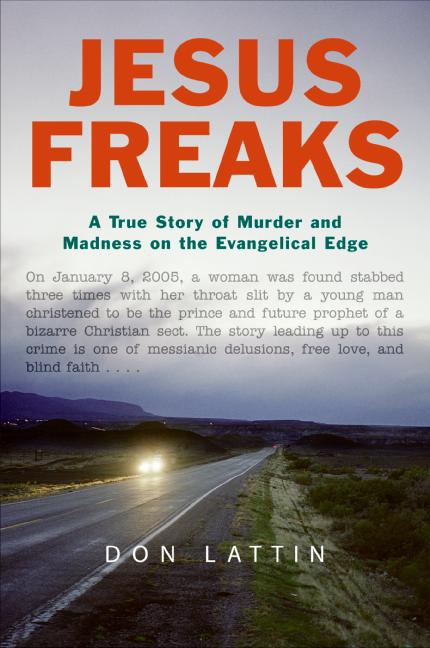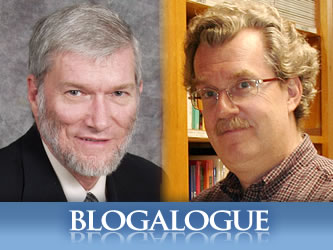
One of the most unshakeable reading experiences I’ve had in the last
year is Don Lattin’s Jesus Freaks: A True Story of Murder and Madness on the Evangelical
Edge. Taking a cue from Jon Krakauer’s Under the Banner of Heaven, Lattin uses the
story of a freakish murder-suicide as the occasion to research the nature of
cultish religious belief. Lattin’s sect is a little less known than Krakauer’s fundamentalist Mormons–in Jesus Freaks we follow the founding and flourishing
of the Children of God/Family International. The group was initially an
offshoot of sorts from the Jesus Movement, the evangelical hippie revival
of the 1970s. But under the teaching of a self-described
messiah and “End-Time Prophet” named David Berg, the Children of God morphed into a sexualized regime that drove its decedents to murderous acts.
When I spoke with Don about his book–read the interview after
the jump–we focused quite a bit on his title. How can an outsider group like
this be described as “evangelical”? I admit that I went into the book
with a chip on my shoulder, because it’s infuriating when the strangest,
most radical elements of Christianity are presented as normative.
But I came away from Jesus Freaks thinking of it as a warning cry. I’ve been a member of church that became a cult of personality, and while as a community we never ventured near the territory Lattin describes in his book, there’s no denying that our allegiance to a powerful central figure clouded our judgment in crucial ways.
Read the interview after the jump.
When I did the historical research on Berg’s beginnings, two things were clear. One, that he definitely came out of the evangelical movement. He was in ministry with his mother and with his children and ordained with the Christian Missionary Alliance. And when the Children of God started, they were originally called Teens for Christ. He initially had support within the evangelical movement until some people started hearing what was really going on underneath.
What were Bergen’s evangelical roots?
He started out kind of Holiness Pentecostal. His mother was a pretty well known evangelist in the 1920s in the mode of Aimee Semple McPherson. That’s where he really learned the tricks of the evangelical trade.
How does someone transition from garden variety evangelical preacher to “The End-Time Prophet”?
This was a guy who was a miserable failure as a preacher and evangelist. He was 50 years old when he started this thing, and he had been in his mother’s shadow for so long. I think a lot of it was he was just mad at the world because of the failures that he had in his own ministry. Then, when he got this following, I think it convinced him more and more that he was a prophet. His time had finally come–you know, the whole Messianic complex.
Berg is often in the background in this book, which I think is probably how he existed for his followers, too.
That’s the thing. How can someone have this much power over people that had never even see him? They didn’t even know what he looked like. They weren’t allowed to see pictures of him. He was a drawing of a lion–a friendly lion–on all the literature, his photograph with a drawing of a lion for the head.
Was Berg central in the minds of the community as the leader of this movement?
No doubt about it. He wrote thousands of missives. I talked to people who were in his inner circle, one that was anonymous in the book. He said that [Berg] never went anywhere without someone carrying a tape recorder. A lot of his writings were just his rantings. He was basically a religious drunk. He would get drunk around the dinner table and start talking, and that’s kind of why he said such outrageous things. But it was later edited and checked, and they still sent it out.
You write that cults show us how religions are born, and you draw a connection between David Berg and Catholic pedophilia and Muslim terrorists. What connects those three different groups?
In a way you could say that all religions start as cults, or sects. Christianity started as a Jewish sect, right? And take the Mormon church–a lot of people still think that Mormonism is a cult. People are so interested in studying the development of Mormonism because there’s a written record. Most religions are from antiquity, and it’s really hard to see what was going on. With Berg–he wrote down everything. So you can see how the theology develops.
What do you think the lesson is in this book?
As a religion writer over the years, I have come across a lot of people who were raised in strict, conservative evangelical–some would say fundamentalist–churches that feel like it was abusive, that they’re survivors of Christianity.
[David Hoyt] said, “The lesson for me is to be very, very careful not to give your loyalty to any new teaching, new prophet, special revelation. My loyalty is to God and Jesus Christ and the Holy Spirit, and to no pastor, teacher or evangelist. I don’t care how big a following they have. No pastor or leader or man is infallible. I’ve got that warning burned on my soul.”
That’s why I think this a book that evangelicals should read.

